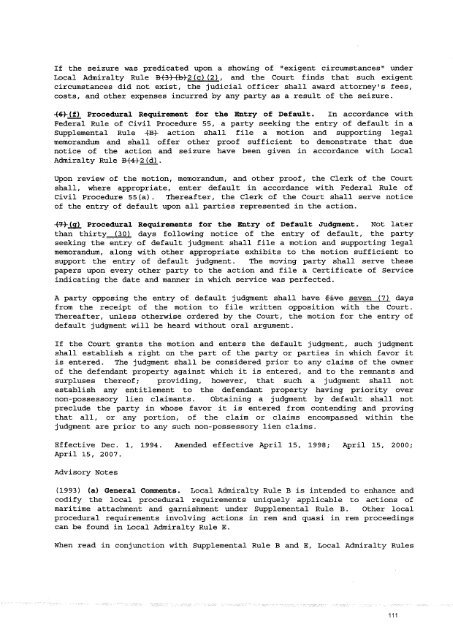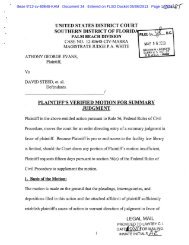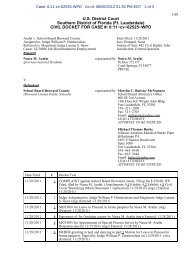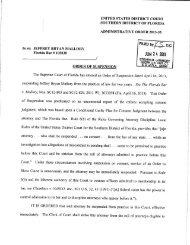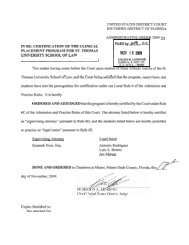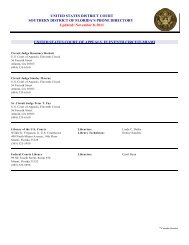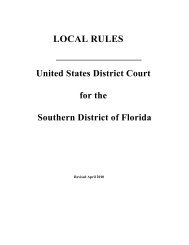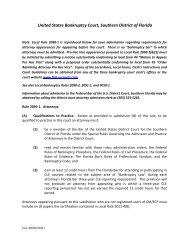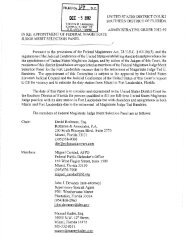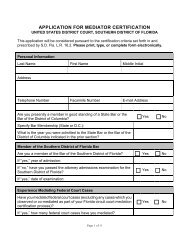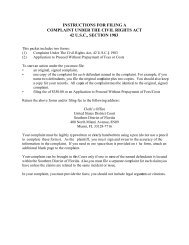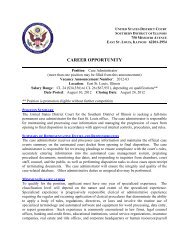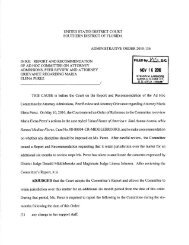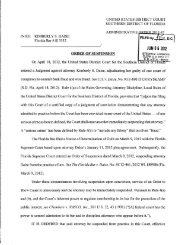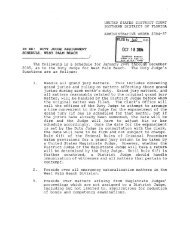JAN j 6 2010 - United States District Court
JAN j 6 2010 - United States District Court
JAN j 6 2010 - United States District Court
You also want an ePaper? Increase the reach of your titles
YUMPU automatically turns print PDFs into web optimized ePapers that Google loves.
If the seizure was predicated upon a showing of "exigent circumstances" under<br />
Local Admiralty Rule B(3) (b) 2 (c) (2) , and the <strong>Court</strong> finds that such exigent<br />
circumstances did not exist, the judicial officer shall award attorney's fees,<br />
costs, and other expenses incurred by any party as a result of the seizure.<br />
4€Mf) Procedural Requirement for the Entry of Default. In accordance with<br />
Federal Rule of Civil Procedure 55, a party seeking the entry of default in a<br />
Supplemental Rule 4B-)- action shall file a motion and supporting legal<br />
memorandum and shall offer other proof sufficient to demonstrate that due<br />
notice of the action and seizure have been given in accordance with Local<br />
Admiralty Rule B(4)2(d).<br />
Upon review of the motion, memorandum, and other proof, the Clerk of the <strong>Court</strong><br />
shall, where appropriate, enter default in accordance with Federal Rule of<br />
Civil Procedure 55(a). Thereafter, the Clerk of the <strong>Court</strong> shall serve notice<br />
of the entry of default upon all parties represented in the action.<br />
4?-)-(q) Procedural Requirements for the Entry of Default Judgment. Not later<br />
than thirty (3 0) days following notice of the entry of default, the party<br />
seeking the entry of default judgment shall file a motion and supporting legal<br />
memorandum, along with other appropriate exhibits to the motion sufficient to<br />
support the entry of default judgment. The moving party shall serve these<br />
papers upon every other party to the action and file a Certificate of Service<br />
indicating the date and manner in which service was perfected.<br />
A party opposing the entry of default judgment shall have five seven (7) days<br />
from the receipt of the motion to file written opposition with the <strong>Court</strong>.<br />
Thereafter, unless otherwise ordered by the <strong>Court</strong>, the motion for the entry of<br />
default judgment will be heard without oral argument.<br />
If the <strong>Court</strong> grants the motion and enters the default judgment, such judgment<br />
shall establish a right on the part of the party or parties in which favor it<br />
is entered. The judgment shall be considered prior to any claims of the owner<br />
of the defendant property against which it is entered, and to the remnants and<br />
surpluses thereof; providing, however, that such a judgment shall not<br />
establish any entitlement to the defendant property having priority over<br />
non-possessory lien claimants. Obtaining a judgment by default shall not<br />
preclude the party in whose favor it is entered from contending and proving<br />
that all, or any portion, of the claim or claims encompassed within the<br />
judgment are prior to any such non-possessory lien claims.<br />
Effective Dec. 1, 1994. Amended effective April 15, 1998; April 15, 2000;<br />
April 15, 2007.<br />
Advisory Notes<br />
(1993) (a) General Comments. Local Admiralty Rule B is intended to enhance and<br />
codify the local procedural requirements uniquely applicable to actions of<br />
maritime attachment and garnishment under Supplemental Rule B. Other local<br />
procedural requirements involving actions in rem and quasi in rem proceedings<br />
can be found in Local Admiralty Rule E.<br />
When read in conjunction with Supplemental Rule B and E, Local Admiralty Rules<br />
111


